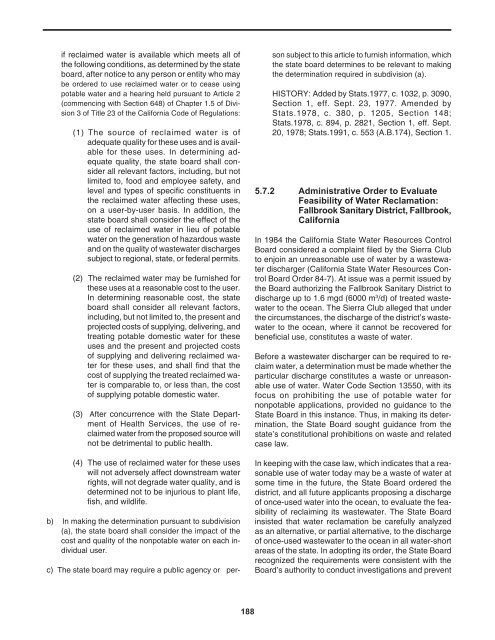o_19f3m1n7k170b14e9u0oqipgu4a.pdf
You also want an ePaper? Increase the reach of your titles
YUMPU automatically turns print PDFs into web optimized ePapers that Google loves.
if reclaimed water is available which meets all of<br />
the following conditions, as determined by the state<br />
board, after notice to any person or entity who may<br />
be ordered to use reclaimed water or to cease using<br />
potable water and a hearing held pursuant to Article 2<br />
(commencing with Section 648) of Chapter 1.5 of Division<br />
3 of Title 23 of the California Code of Regulations:<br />
(1) The source of reclaimed water is of<br />
adequate quality for these uses and is available<br />
for these uses. In determining adequate<br />
quality, the state board shall consider<br />
all relevant factors, including, but not<br />
limited to, food and employee safety, and<br />
level and types of specific constituents in<br />
the reclaimed water affecting these uses,<br />
on a user-by-user basis. In addition, the<br />
state board shall consider the effect of the<br />
use of reclaimed water in lieu of potable<br />
water on the generation of hazardous waste<br />
and on the quality of wastewater discharges<br />
subject to regional, state, or federal permits.<br />
(2) The reclaimed water may be furnished for<br />
these uses at a reasonable cost to the user.<br />
In determining reasonable cost, the state<br />
board shall consider all relevant factors,<br />
including, but not limited to, the present and<br />
projected costs of supplying, delivering, and<br />
treating potable domestic water for these<br />
uses and the present and projected costs<br />
of supplying and delivering reclaimed water<br />
for these uses, and shall find that the<br />
cost of supplying the treated reclaimed water<br />
is comparable to, or less than, the cost<br />
of supplying potable domestic water.<br />
(3) After concurrence with the State Department<br />
of Health Services, the use of reclaimed<br />
water from the proposed source will<br />
not be detrimental to public health.<br />
(4) The use of reclaimed water for these uses<br />
will not adversely affect downstream water<br />
rights, will not degrade water quality, and is<br />
determined not to be injurious to plant life,<br />
fish, and wildlife.<br />
b) In making the determination pursuant to subdivision<br />
(a), the state board shall consider the impact of the<br />
cost and quality of the nonpotable water on each individual<br />
user.<br />
c) The state board may require a public agency or person<br />
subject to this article to furnish information, which<br />
the state board determines to be relevant to making<br />
the determination required in subdivision (a).<br />
HISTORY: Added by Stats.1977, c. 1032, p. 3090,<br />
Section 1, eff. Sept. 23, 1977. Amended by<br />
Stats.1978, c. 380, p. 1205, Section 148;<br />
Stats.1978, c. 894, p. 2821, Section 1, eff. Sept.<br />
20, 1978; Stats.1991, c. 553 (A.B.174), Section 1.<br />
5.7.2 Administrative Order to Evaluate<br />
Feasibility of Water Reclamation:<br />
Fallbrook Sanitary District, Fallbrook,<br />
California<br />
In 1984 the California State Water Resources Control<br />
Board considered a complaint filed by the Sierra Club<br />
to enjoin an unreasonable use of water by a wastewater<br />
discharger (California State Water Resources Control<br />
Board Order 84-7). At issue was a permit issued by<br />
the Board authorizing the Fallbrook Sanitary District to<br />
discharge up to 1.6 mgd (6000 m 3 /d) of treated wastewater<br />
to the ocean. The Sierra Club alleged that under<br />
the circumstances, the discharge of the district’s wastewater<br />
to the ocean, where it cannot be recovered for<br />
beneficial use, constitutes a waste of water.<br />
Before a wastewater discharger can be required to reclaim<br />
water, a determination must be made whether the<br />
particular discharge constitutes a waste or unreasonable<br />
use of water. Water Code Section 13550, with its<br />
focus on prohibiting the use of potable water for<br />
nonpotable applications, provided no guidance to the<br />
State Board in this instance. Thus, in making its determination,<br />
the State Board sought guidance from the<br />
state’s constitutional prohibitions on waste and related<br />
case law.<br />
In keeping with the case law, which indicates that a reasonable<br />
use of water today may be a waste of water at<br />
some time in the future, the State Board ordered the<br />
district, and all future applicants proposing a discharge<br />
of once-used water into the ocean, to evaluate the feasibility<br />
of reclaiming its wastewater. The State Board<br />
insisted that water reclamation be carefully analyzed<br />
as an alternative, or partial alternative, to the discharge<br />
of once-used wastewater to the ocean in all water-short<br />
areas of the state. In adopting its order, the State Board<br />
recognized the requirements were consistent with the<br />
Board’s authority to conduct investigations and prevent<br />
188



